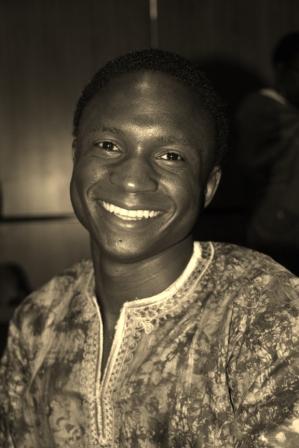FEMI TAIWO ON MONDAY: Our Struggle with Discussing Luck
This is the third – and final – piece of a series. You can read the first piece here; and the second piece here. We have some ground to cover so let’s jump straight in.
Most of us were raised in a Western philosophy of self-determinism which teaches that we choose our destiny. Self-determinism says that no matter what happen to us, our lives would be dictated by what we allow to happen in us. That whatever we decide to do within the space between stimulus and response determines our growth and happiness; determines our success.
William Ernest Henley incarnated this pure strain of Western thought with his Invictus poem published in 1888. In its last stanza; he famously declared, “It matters not how strait the gate, How charged with punishment the scroll, I am the master of my fate: I am the captain of my soul.”
This is Western philosophy at its best. It is a me philosophy. I am the center of the universe. I – and only I – determine whatever results I have. Give me all the credit when I succeed and blame me when I fail because I run things. I don’t care what life dishes me, it doesn’t matter anyway, what counts is how I respond to it. My response determines my success.
To be sure, I castigate not this classic Western belief. It is a philosophy that has given us modern civilization as we know it (starting from the Renaissance period). Rationalization and scientific inquiry, the twin thinking modes that are pushing technological boundaries beyond what our ancestors could ever dream, are made possible because people believe they determine life’s outcomes.
I agree with Apple’s 1997 commercial, “those crazy enough to think they can change the world are the ones who do.” We love this school of thought because of our desire for control. “A sense of personal control is integral to our self-concept and sense of self-esteem” observes Leonard Mlodinow, author of the bestseller, The Drunkard’s Walk. It is pointless to argue against the doctrine of self-responsibility. So I understand both the personal and public utility of the self-centeredness characteristic of this Western mindset.
The problem I have with it is that, more often than not, it discards another paradigm which I call the Eastern philosophy. The ancient Babylonians believed that “If a man be lucky, there is no foretelling the possible extent of his good fortune. Pitch him into the Euphrates and like as not he will swim out with a pearl in his hand.”
Or as the wisest man who ever lived was inspired to write: “I returned and saw under the sun that—The race is not to the swift, Nor the battle to the strong, Nor bread to the wise, Nor riches to men of understanding, Nor favor to men of skill; But time and chance happen to them all. For man also does not know his time: Like fish taken in a cruel net, Like birds caught in a snare, So the sons of men are snared in an evil time, When it falls suddenly upon them.”
The first quote tells us that good luck trumps circumstances; even if you are thrown in a river as turbulent as the Euphrates, you won’t only survive but thrive just because of your good fortune (i.e. luck). The second tells us that you may be the smartest, strongest and fastest and yet come out bottom because of bad luck (time and chance).
It is a lie that you determine 100% the outcome of your life. Chance plays as much of a role in your destiny as planning and/or innate abilities. The human brain can be likened to a very advanced super-computer with dazzling abilities. And the output of any computer is based on two things: input and the processing of that input.
Let’s go back to your first computer lessons: Input + CPU = Output [CPU is Central Processing Unit; here, it means your brain or mind]. Western philosophy says that the stimulus, or Input, you receive does not matter. What matters is how awesome your CPU is. We know from experience that this is not true. Ever heard of Garbage In Garbage Out (GIGO)?
Eastern philosophy teaches that your Output has been pre-destined; it depends solely on how great or how bad your Input is. This is incomplete as well. If I were a betting man, I would always put my money on the swiftest horse even though I know he may not always win the race.
The answer, the truth, resides somewhere between the spectrum bounded by these two philosophies. Any successful endeavor, be it on an individual, organizational or societal level, owes as much to luck as to careful planning. The Input I referred to earlier is outside of your control so I call it a random event, or luck. The CPU is you; you are firmly in control of that. The interactions of these two determine your success or failure in life.
I will quote Leonard Mlodinow again, and let him conclude this three-part Luck series for me because I have found no better words that succinctly capture my thoughts on this: The cord that tethers ability to success is both loose and elastic.
It is easy to believe that ideas that worked were good ideas, that plans that succeeded were well designed, and that ideas and plans that did not were ill conceived. And it is easy to make heroes out of the most successful and to glance with disdain at the least. But ability does not guarantee achievement, nor is achievement proportional to ability. And so it is important to always keep in mind the other term in the equation – the role of chance.
Established in March 2013, JarusHub is a Nigerian information hub with focus on career and management. It is rated Nigeria's most authoritative destination for online career resources. It parades an array of Nigerian professionals who share their career experiences with a view to bridging career information gap and mentoring a generation to success. Whether you're a student, a recent graduate or an established professional, or even an executive, you will always find something to learn on JarusHub. All enquiries to jarushub@gmail.com or 0808 540 4500. Facebook: www.facebook.com/jarushub; Twitter: @jarushub or @mcjarus.
Rage, Sadness, Gratitude and Hope: An Interview to Remember
November 16, 20203 Ways to Ensure Job Security in a Massive Shakeup
March 19, 2018
20 comments
Let us have your say by leaving a comment belowCancel reply
Recommended For You
-
WHAT CAN HE INVEST HIS 20K IN?
June 4, 2014 -
Career in world’s biggest consulting firms: What you need to know
December 22, 2013 -
CITY & GUILDS ACCREDITED CENTRES IN NIGERIA
June 18, 2018









Great one Femi Taiwo. This article and more of your feats justifies why you have a Phd. I love the part about time and chance.
When it’s not one’s time yet, even the best efforts will produce an average result
You are absolutely correct. There is nothing as powerful as an idea whose time has come. So a poorly timed great idea would be powerless.
Ok, doc, so how does one increase his luck factor? Or do we just sit down and wait for our “time” to come?
You can increase your luck factor by getting prepared, so that you are well positioned for opportunities. Try to help as many people as possible, because you never know where you luck will come from. You also need to get closer to the higher being, some people call Him God, Allah, Olorun.etc.
The former MD of May and Baker Dr. Joseph Odumodu, now director general 0f Standard Organisation of Nigeria, got his job as the top guy at May and Baker courtesy of his driver.
Some Asians bought the company where he was working, and his days in the company were numbered. He had been job hunting for months all to no avail, but his driver got information from a fellow driver at a rival company that the European CEO of May and Baker would be leaving soon.
Because Joseph Odumodu was very nice to his driver, the driver passed the information he received to his boss, Odumodu dropped his CV and the rest became history.
Dr. Femo. What a great piece!
Thank you Zulqarnaen! What did you like best about the piece?
Love this piece and the line of thought. It captures what life really is. Success in life is not always certain but efforts shouldn’t be left out of things. Nice one.
Effort is definitely needed! If you have good fortune and you are thrown into the Euphrates, you still need to physically apply effort and swim out or else you drown! Effort is an indispensable part of the equation; it is necessary but not sufficient.
yes u have said it all, those elements count( time , chance , western eastern school of thought,thanks very much
When we realize many factors come together to make us successful, we remain humble. It helps us not deify winners or vilify losers. It makes us balanced in our appraisal of outcomes.
To succeed in our struggles we must be prepared, ready to make good use of opportunities and most importantly the God factor is a major factor. may be that is what you call luck.
The teacher who bought 2 plots of land at Ajah Lagos Nigeria for a total of 220k in year 2001, only to sell the land for N20 million in March 2013.
Was prepared by educating himself about saving, investment, living below your means and importance of delayed gratification, when the opportunity to buy the land came he was able to grab it. And the God factor that gave him the wisdom, right network and associates, meeting the right people at the right place at the right time.
That is a perfect example, Emmanuel. I have also known people that bought real estate just before the global recession and lost a lot of money. Few experts saw the recession coming. That’s life…many factors come into play, and some would be outside of our control. The trick is to be ok with that [knowledge].
I think investors need to learn from history, what was the Price/ Earning ratio of property before the recession.
Knowledge is very important, divine knowledge or luck may enable one to identify opportunities, because at times opportunities camouflage as obstacles. Very few people get their opportunities on a platter of gold.
@Caleb, excellent question! I will attempt to answer your question in my next article. Let me give you a tip: Yes, you can increase your “luck factor”
Great food for thought here. I like your balanced perspective!
@ everyone, I have yet to find the 2nd part of this write-up from Dr. All I get is the 1st and the last part. Help please!
Hey Doc-in-Law……………. great to find your exploits here, albeit accidentally. One of my favorite pieces out of d few have read. I completely share your sentiments about luck & planning, goes hand in hand to the making of a successful enterprise.
But also believe in been ready to to maximize luck when it shows up!
Great job!! You are really a man of many side
Geekay! Thank you!! Glad you discovered this site.
This piece is fine and well thought out. More power to your stream of wisdom. I love it.